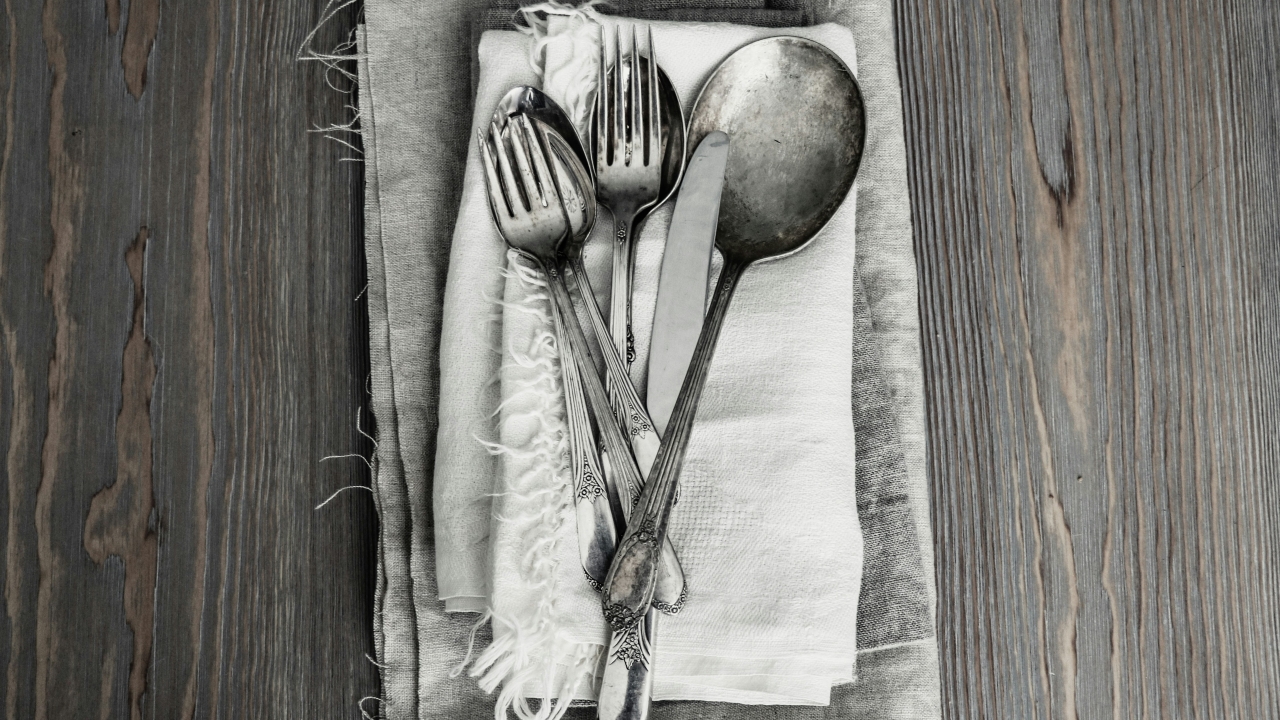
IKEA vs Heirlooms: Why We Need Family Treasures
As we gathered around our dining table on Christmas night, I saw my mother-in-law’s eyes light up when she looked down at her place setting. There, on the cloth napkins I only bring out on special occasions (I avoid extra laundry at all cost!), was the silverware that had belonged to her parents and was then gifted to us when we got married. A few days before Christmas I had taken the time to make sure each piece was polished to its original shiny state and the silver sparkled under the soft glow of twinkling lights on the Christmas tree nearby. The silver was given to Nellie and Llewellyn as a wedding gift in 1924 and then passed onto my in-laws in 1968 who then gave it to us in 1998. And it meant so much to them to see it gracing the table where three generations broke bread together in honor of the birth of our Savior.
This set of silverware is just one of many heirlooms we have in our home. Some can be seen as you walk from room to room. Others are carefully packed away in our attic. My children have grown up seeing antique books on a coffee table, vintage toys in their bedrooms and even pieces of furniture that were all passed down from one generation to the next. But as my nest gets closer and closer to being empty, I’m keenly aware of the fact that many of these cherished items might not be as welcome in the homes of future generations.
There have been many news reports about the trend of Millennials and Gen Z rejecting the family treasures their parents would like to pass onto them. A PBS article on the subject says this, “This is an Ikea and Target generation. They live minimally, much more so than the boomers. They don’t have the emotional connection to things that earlier generations did,” she notes. “And they’re more mobile. So they don’t want a lot of heavy stuff dragging down a cross country move for a new opportunity.”
I’m sympathetic towards the younger generations to a degree. While all older people tend to find themselves wondering what to do with the stuff they’ve accumulated over a lifetime, Boomers win the award in this category. Raised by parents who lived through wars and the Great Depression, many of them then turned around and raised their own children in the 80’s which was known for its excess. On one end, Boomers had the generation before them clinging to every last family treasure that didn’t have to be sold to keep from starving and on the other end they had the next generation indulging in the latest and greatest that money could buy. It’s no wonder they find themselves with too many things. So they shouldn’t be surprised that their children and grandchildren look at that china cabinet stuffed full of odds and ends and think it would make pretty good kindling.
But, as is usual in culture, the pendulum that swings so far one way finds itself swinging in the extreme opposite direction as it attempts to compensate. And that is why I feel so compelled to make the case for the importance of family heirlooms. Cicero said, “To be ignorant of what occurred before you were born is to remain always a child. For what is the worth of human life, unless it is woven into the life of our ancestors by the records of history?” You will never look lovingly at your cheap IKEA dining table and think about the many decades of people who have gathered around it for a meal. It’s unlikely that it would even last more than a few years before falling apart. Your Target ‘dollar spot’ home decor won’t be tied to stories of survival and love and sacrifice.
The problem is that if our homes are only filled with things that are disposable, we risk losing the ties that connect us to our history and to our future. Media pundits and the institutional elite are creating new definitions and attempting to rewrite history. They work hard to make us so ashamed of our nation’s failings that we can never celebrate the successes. Dystopian novels, written as warnings, have become reality. Whether it’s on an individual or societal level, severing our bonds to the past is a dangerous practice. One of the greatest ironies is that while they are rejecting heirlooms, the younger generations are expressing greater interest in environments that embrace a more traditional approach to life. Perhaps that pendulum will get back to the center after all.
Now, do you have to accept every single knick-knack that you’re offered? Of course not. If you are anything like me and easily guilted into saying yes this will require nerves of steel. One look into those eyes filled with wisdom and surrounded by well-earned wrinkles and you may just crumble, only to find yourself the new owner of a ceramic ashtray from 1976. So my recommendation is to take some time to really think about what matters to you the most. It could be anything from furniture to books to silverware but it definitely shouldn’t be nothing at all. If you are worried about not having enough space to store even a few heirlooms then I suggest throwing away some of your cheap TJ Maxx Chotskies to make the room. You won’t regret it.
With the holiday season rapidly approaching, I encourage you to incorporate heirloom pieces into your festivities. It doesn’t need to be a silverware service for ten but it could be something as simple as reading from a family Bible as you pray over your Thanksgiving meal. Or maybe it’s hanging your own childhood ornaments on the Christmas tree even if they don’t perfectly coordinate with your Pinterest worthy color scheme. While a legacy is about so much more than what is tangible, it’s often those things that we can see and touch that connect us to the intangible. It’s not the item itself that brings us joy but the memories evoked by that item. Ultimately though we know that our earthly heritage is only temporary. So our hearts, minds and actions should be turned towards our eternal inheritance as we follow and serve Jesus Christ.
“Things that we have heard and known, that our fathers have told us. We will not hide them from their children, but tell to the coming generation the glorious deeds of the Lord, and his might, and the wonders that he has done.” Psalm 78:3-4

